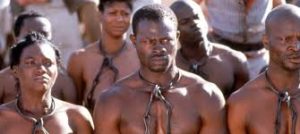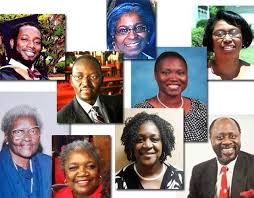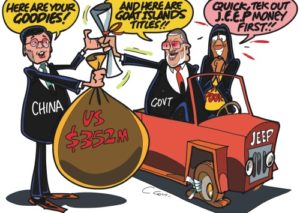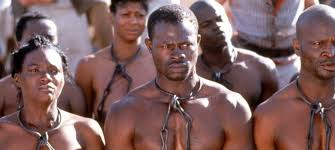What if they had thrown a spear that morning instead of greeting them with curiosity?
The riverside village was alive with movement. Children were running around, playing games which mimicked the activities of their elders. The boys pretended that they had just returned from the hunt, four of them struggling with the imaginary weight of their bounty. Their shouts of triumph spoke of years to come when they would assume the very real role of protectors and providers in their community. In the shade of the ancient tree, little girls played at grinding flour and making cakes. A few pretended to wash clothes. The women tended their gardens, nursed babies and kept a watchful eye on the children. The men sat in a circle planning their next foray into the jungle.
“Look, look!” shouted one woman who had gone down to the river’s edge to collect water.
As the villagers looked out on the river they were greeted with a strange sight. Floating down the river, on a vessel larger than they had ever seen, were men with skin that had no colour. They were clothed in a manner unlike anything they had ever seen. Several of the men appeared to have one eye which protruded from their faces like a hollow stick. The people were curious. The large vessel with the curious looking men approached the shore slowly, and meeting no resistance, docked and disembarked.
And so it began.
The white men were allowed access to the village
They impressed the villagers with things hitherto unknown.
And villagers from other communities were captured and taken away from their village to become slaves.
And the white strangers did not act alone.
 |
| Scene from the movie “Amistad” based on true events |
Let’s Go There…
They were facilitated in the first instance by being granted access, and they were then aided and abetted by members of the community, made easy in a context of an already existing system of slavery. The villagers turned over their own slaves in return for various offerings made by the white man. The villagers also went on hunting expeditions with the white man to capture would be slaves from rival tribes, again in return for gifts and protection. As the white men grew comfortable and more greedy, and as captives escaped the slavers’ nets and returned with tales of horror to the village, the villagers realized that the white strangers had taken advantage of their ancient traditions in order to exploit. The slavery that the white men instituted did not resemble what was being practiced in the areas of Africa they sought to plunder.
But it was too late.
Having been granted access, the white man was able to overcome any delayed resistance now offered. His guns, medical knowledge and boats gave him superior fighting power, the ability to actually survive in this dangerous (to him) tropical climate and granted him access where once there was none. Hundreds of thousands of Africans were roughly displaced and cruelly deployed in lands way across the seas. Hundreds of thousands of Africans perished and were killed on the way to these alien territories. Hundreds of thousands of Africans were enslaved and brutalized and murdered by these white men who leveraged their position in a land that was not theirs, a land that they plundered again and again and again to enrich their homeland in Europe.
What if they had thrown a spear that morning instead of greeting them with curiosity?
To be clear: this question is not about casting blame for what was to come on those who were enslaved and murdered. A sequence of events occurred that ended in what has become an inescapable part of history. Access and then support from the village enabled the wicked motives of the white strangers.
Eventually, the slave trade, as the forcible removal of the peoples of African came to be known, was outlawed. Slavery itself was eventually abolished throughout the Americas, and European colonies demanded independence and self rule. Throughout the period there was resistance and revolt on the part of the enslaved peoples. There were also white people who organised and fought against the trade in slaves and practice of slavery.
Anti-colonialists who fought for independence from their European masters envisioned prosperous, orderly societies, where the dignity of the citizen underpinned ever law, every decision and governance on a whole, where cultural norms were truly their own, and not those superimposed by those who had no right to be in charge. Look around though:
The Democratic Republic of the Congo in Africa.
Haiti in the Caribbean.
Jamaica.
Is this what self-rule was meant to be?
Once again, centuries later, we have granted men, not of our own tribe, strangers to our village, access. Once again, some of our own village are aiding and abetting the stranger, to the detriment of the whole. And once again, we find ourselves on a course not really of our own choosing, so many of our own existing in unjust and hard and terrible, destitute circumstances.
Access has been granted by the few who seek to enrich and protect themselves, while giving not one damn as to legacy, nationhood and true freedom for all.
Dylann Roof was welcomed by worshipers in their church Charleston, North Carolina. He was a stranger in their midst, a young white man, an incongruous presence in this old, black place of fellowship. Suppose the worshipers had suspended their prayer and study to probe a little, seeking to determine Roof’s reason for his being there? Suppose access had not been automatic, might the outcome of that terrible day have been different?
 |
| Dyalnn Roof. Photo courtesy of MSNBC |
 |
| The Victims of the Charleston Massacre |
Those of our village entrusted with the responsibility of keeping us safe and protecting our interests have granted access in return for their own protection and their own enrichment.
How else does one describe and explain a 1.5% “agent’s fee”payable on national capital projects?
This access has resulted in selective prosperity and mass impoverishment, creating a ripe context for Powerful Capital to set our economic agenda. Repeat after me: “I.M.F.”
 |
| Image courtesy of balcostics.com |
This access has resulted in a new colonialism by a people who look nothing like us, under the guise of partnership and cooperation. But how can an impoverished, desperate people really partner with a larger, stronger, richer people? The loss of choice lands to these “partners” and potential environmental degradation is what we can count on. That’s not partnership.
 |
| Cartoon by Clovis of the Jamaica Observer |
Access has been granted and the stranger in our midst is being aided and abetted by our own. If history is anything to go by, we know how the story ends.

